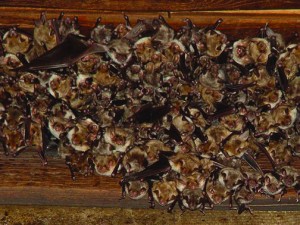Call Tri-State Wildlife Management for Professional Bat Removal Services in Northern Kentucky and the Greater Cincinnati area 859-635-0037. Serving Northern Kentucky and Greater Cincinnati.
There have been a lot of articles circulating online in regards to the solar eclipse and the strange phenomenon that will occur during this time. Vets and animal experts are advising to keep pets indoors to protect there eyes from permeate damage. However, this leads one to wonder how wild animals will react to this rare occurrence. One article in particular on knowledge news states that it is “difficult for scientist to say conclusively how much the moon blocking out the sun’s rays has affected animals over the years since the events are always so brief. Despite this limited observation window there have been odd behavior observed in insects, birds, and mammals such as chimpanzees, cows, and giraffes. With all of the unknown about animals and their reaction to the eclipse it started me thinking about whether or not traditionally nocturnal animals will suddenly become active. More specifically whether or not bats will leave their roost and fly during a solar eclipse.
One thing to consider when pondering this concept is an animals typical cycle of activity. Most people are familiar with diurnal (active during the day) and nocturnal (active at night), however most people are unaware of the term crepuscular. Crepuscular is derived from the Latin word for twilight and describes animals that are primarily active during dusk and dawn. Rabbits, deer, skunks, opossums, and the common house cat are some of the most commonly known crepuscular animals that we have in this area. Uniquely enough these animals are also known to be active on overcast days and moonlit nights. Therefore, one might observe more active behavior from these animals during such an occurrence as a solar eclipse.
Since we are in the heart of bat exclusion season, and juvenile bats have finally started leaving the roost, one can only wonder if these irresponsible teenagers will attempt to leave the roost during the day of a solar eclipse. Will bats fly during a solar eclipse? According to Chris Smith, of the Naked Scientists based out of Cambridge University, bats like humans and many other mammals have an internal clock that allows them to fall asleep and wake on a pretty predictable cycle. “It’s called the suprachiasmatic nucleus and that keeps time. It is a few thousand nerve cells, maybe 20,000 nerve cells that are all interconnected and they are running a genetic program. This molecular clockwork takes about 24 hours to go round a complete cycle.” “So these nerve cells become more or less active and they secrete various hormones into the blood stream, and they go round the body and inform all of the tissues in the body that have their own body clocks, what time it is. So you have this master clock in your head and you have these other slave clocks – if you like- in every cell in your body. That’s how your tissues know what time of days it is.” According to Chris some animals, such as bats, have their clocks reversed. Causing them to awake during twilight/dusk and retreat to bed at dawn.
In addition to a bats internal clock, bats also use the sun, moon, and the earths magnetic field to navigate. “They know where the moon is, and they know where east and west is, because they know where the sun is setting and they know where it is rising and they set their body clocks with the earth’s magnetic field as well. So they have a magnetic response element in their brains, they look at where the sun is in the sky. They then know that the sun rises and sets east and west. They know what time it is in their body clock and they lock their body clock onto the magnetic signal of the earth, and they know which direction to fly.” Further more, according to one researcher if you make a bat “jet lagged” by interrupting their cycle and exposure to light and dark they can actually fly off in the wrong direction.
After my readings I think I am going to be more interested in the wildlife around me than the solar eclipse. I hope to catch the deer and rabbits running through the back yard, and maybe a few bats flying through the sky. Either way it’s going to be an interesting day.
Tri-State Wildlife Management is committed to helping wildlife and people live communally while protecting you, your health, and your property. If you are currently experiencing a bat issue in your home or property, please give us a call at 859-635-0037.
Comments are closed.










